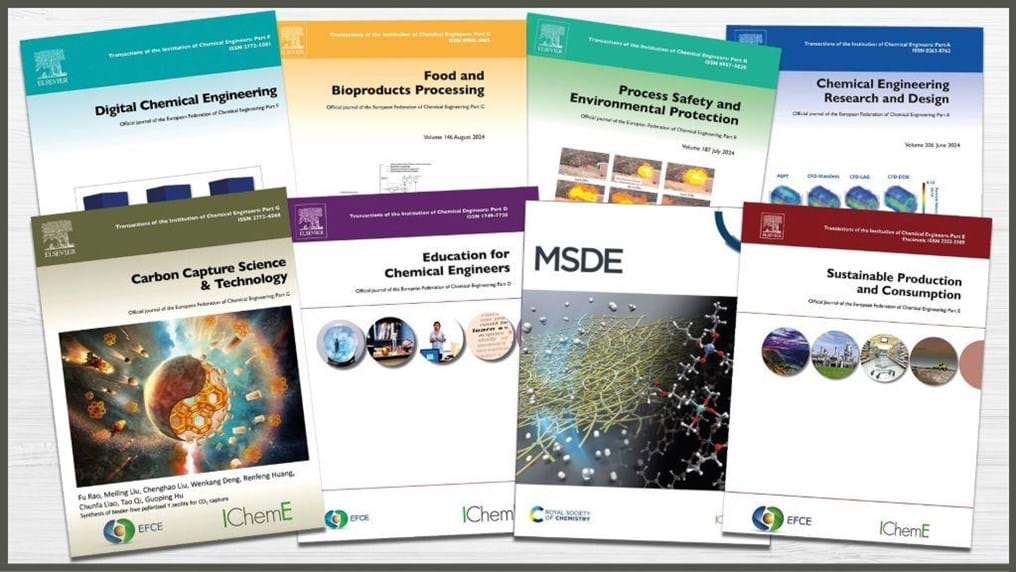IChemE’s Carbon Capture Science & Technology journal drives further success in Impact Factor rankings

4th July 2024
IChemE open access journal Carbon Capture Science & Technology (CCST) has received its first Impact Factor of 10.4, placing it ninth out of 170 journals included in the chemical engineering category.
An outstanding achievement for a journal only launched in 2021, this ranking continues the success the journal saw earlier in the year with its selection as a finalist in the Association of American Publishers' 2024 PROSE Awards. CCST is the second of IChemE’s journals to achieve a double-digit Impact Factor, following Sustainable Production and Consumption reaching this milestone last year.
Sustainable Production and Consumption remains in double figures in 2024 too, with an Impact Factor of 10.9. This places it seventh out of the 91 journals ranked in the green and sustainable science and technology category. It maintains its place in the top 10% of this category.
Another IChemE journal receiving its first Impact Factor this year is Digital Chemical Engineering, which has received an Impact Factor of 3.0. This places it in the second quartile of journals in the chemical engineering category.
According to Clarivate, the company calculating Impact Factors, 2024 has seen a return to more typical citation and publication patterns after the unusually high level of activity during the pandemic. This has resulted in Impact Factors for most journals weakening this year. This trend has also been reflected in the 2024 Impact Factors for IChemE’s established journals, but in most cases, to a lesser extent than their competitors.
Process Safety and Environmental Protection has continued to see its annual citations increase. With an Impact Factor of 6.9, it remains in the top quartile of all chemical engineering journals, currently ranking 16 out of 81 in the environmental engineering category.
Education for Chemical Engineering has also seen its annual citations increasing, moving it up to the top 15% of journals in the scientific discipline's education category. It is one of only two engineering education-focused journals ranking this highly in a category traditionally dominated by medical and chemical education titles.
In other journal news, Chemical Engineering Research and Design has improved its placing in the chemical engineering category to reach the top 24% with an Impact Factor of 3.7. Meanwhile, Food and Bioproduct Processing received an Impact Factor of 3.5, keeping it within the second quartile of journal rankings for food science and technology and chemical engineering categories.
Molecular Systems Design and Engineering, a journal co-owned by IChemE and the Royal Society of Chemistry, also retains its second quartile position in the rankings for the physical chemistry category with an Impact Factor of 3.2.
Dr Chunfei Wu, Founding Editor-in-Chief of CCST, said: “We are delighted to have received an Impact Factor of 10.4 for Carbon Capture Science & Technology, a reflection of the excellent standard of our published papers. Moving forward, CCST will continue to maintain this standard to serve as the premier platform for disseminating carbon capture science and technologies.”
Pippa Wright, Managing Editor, IChemE journals, said: “Such a high first Impact Factor for Carbon Capture Science & Technology is a richly deserved reflection of the commitment and passion of Dr Wu and the dedication of the whole editorial board that has helped to attract such a high quality of contributions to the journal. It is great to see CCST becoming recognised as a leading publication in this field. "
Notes for editors
About Impact Factors:
Impact Factors are a measure of how often content published in the journal is cited elsewhere, and therefore measure the reach of the journal and the impact of its content. The score is calculated by Clarivate using the number of citations in the most recent year to a journal’s articles and reviews published in the two years prior to that, divided by the total citable items published in those two years – i.e. 2023 Impact Factors reflect the total number of citations in 2023 to citable items published in 2021 and 2022 divided by the total number of citable items published in 2021 and 2022.
Links
Contact
For more information please contact:
Ann Baylis, Communications Executive and PR Lead, IChemE
t: +44 (0) 1788 534477
e: abaylis@icheme.org
Dan Owens, Communications Executive, IChemE
t: +44 (0) 1788 534458
e: dowens@icheme.org
What is chemical engineering?
Chemical, biochemical and process engineering is the application of science, mathematics, and economics in the process of turning raw materials into everyday, and more specialist, products. Professional chemical engineers design, construct and manage process operations all over the world. Energy, pharmaceuticals, food and drink, synthetic fibres and clean drinking water are just some of the industry sectors and products where chemical engineering plays a central role.
IChemE
The Institution of Chemical Engineers (IChemE) advances chemical engineering's contribution for the benefit of society. We facilitate the development of chemical engineering professionals and provide connections to a powerful network of around 30,000 members in more than 100 countries.
We support our members in applying their expertise and experience to make an influential contribution to solving major global challenges, and are the only organisation permitted to award Chartered Chemical Engineer status and Professional Process Safety Engineer registration.